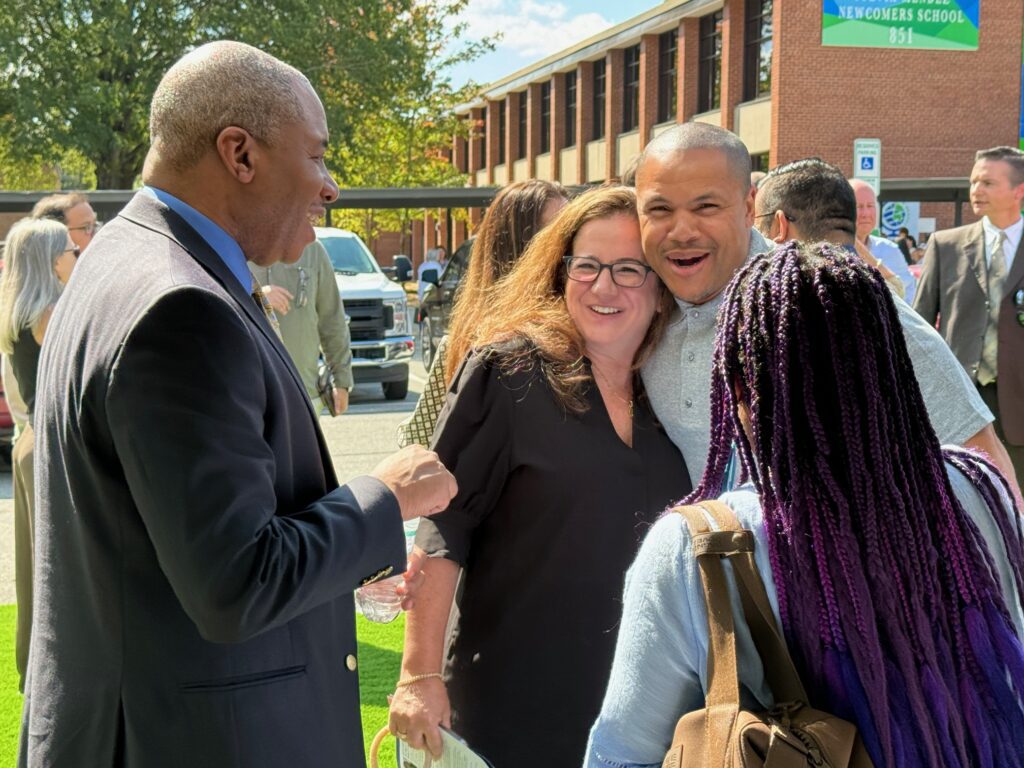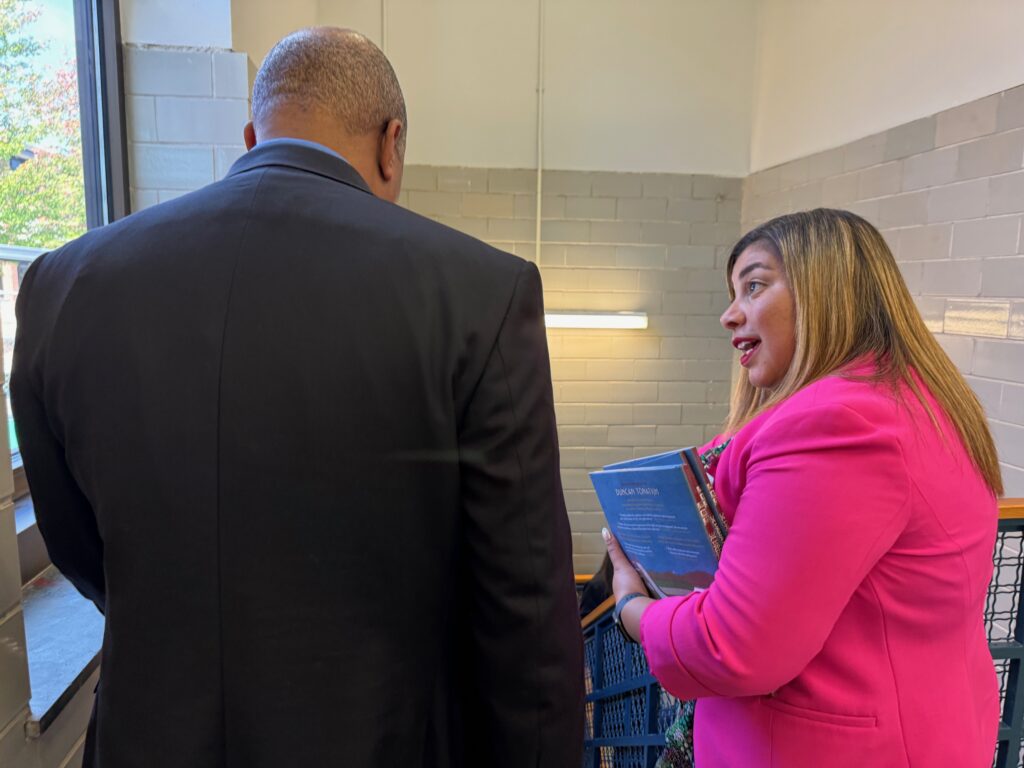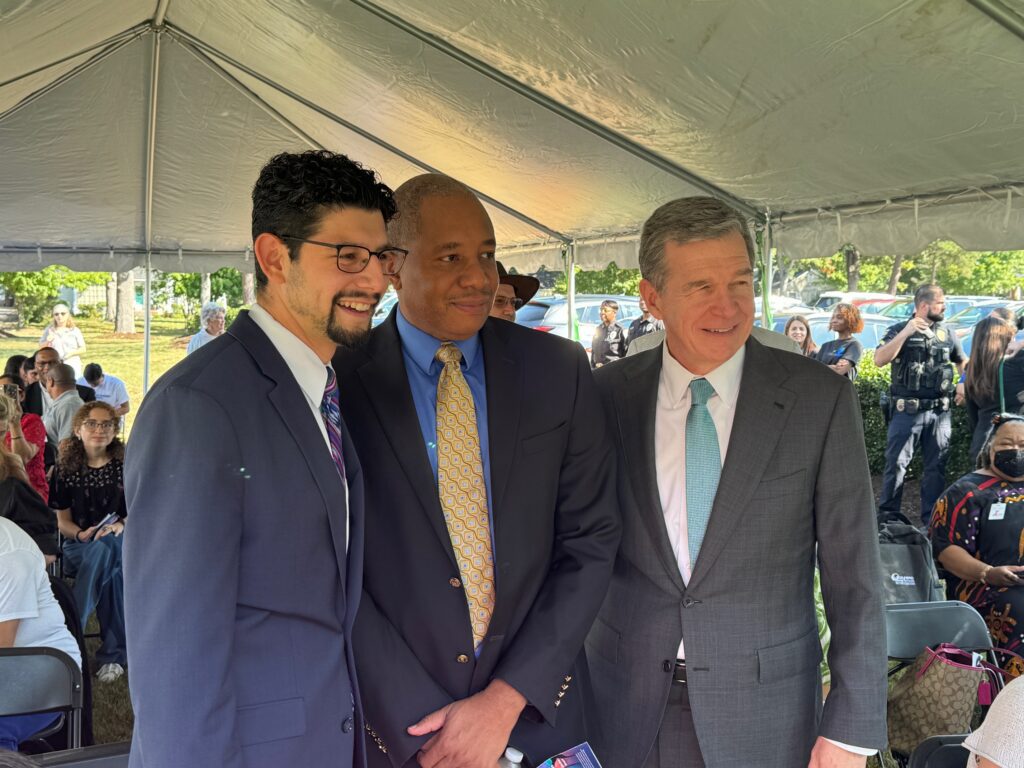
|
|
Updated on March 6, 2024: Mo Green won the primary election and will be the Democratic candidate for superintendent of public instruction in the general election on Nov. 5, 2024. He will be running against Republican Michele Morrow.
“Known statewide as a champion of public education,” Maurice O. “Mo” Green, age 56 and a registered Democrat, announced on Wednesday that he is running for State Superintendent of Public Instruction.
“There is much to celebrate about public education in North Carolina and its transformative power. However, it is long past time for our state to truly fulfill its promise to each of its students – that no matter who you are, you will receive high-quality educational opportunities that will prepare you to be successful,” he said in his announcement. “We can make that happen if we invest fully in public education, ensure safe and secure learning environments for our students, enhance parent and community support, and revere our educators.”
Read the full announcement here.
The office of state superintendent is one of many positions up for election in 2024.
Green enters the race at a time when Republicans proposed and passed the largest expansion of school choice in recent history, and in response, Democratic Gov. Roy Cooper has declared a state emergency for public schools.
Green has said, “I have always revered educators.” And in this editorial interview with The Charlotte Observer in 2016, he said, “There is a strong and growing devaluation of educators. People aren’t looking to see how many wonderful things go on every day in our educational system.”
Green has been a lawyer, a district superintendent, and a philanthropist.
He believes in the power of public-private partnerships.
He believes in the power of working across lines of difference, serving for years on the steering committee of Duke’s North Carolina Leadership Forum, which provides an opportunity for civic, business, and political leaders to discuss and understand different points of view about issues central to the future of our state.
He is known locally in Guilford County and statewide for his listening and learning tours, titled “Mo Wants To Know.” He has said, “effective leaders do a lot of listening.”
Green was born in New York, grew up in Georgia, and is a long-time resident of North Carolina. He attended Duke University for his bachelor’s degree in political science and economics and for his law degree.
He is a huge Duke fan.
Green held two federal judicial clerkships — one for the middle district in North Carolina and the other for the sixth circuit court of appeals, which sits in Ohio and serves Kentucky, Michigan, Ohio, and Tennessee. He went on to become a partner with the law firm of Smith Helms Mulliss & Moore LLP in Charlotte before his career took him into education and philanthropy.
On his leadership as district superintendent
A “lateral-entry administrator,” Mo Green was the first Black superintendent of the unified Guilford County Schools (GCS). He served as superintendent for seven years from 2008 until 2015.
GCS is the third largest school district in North Carolina, and when he was leading it, Green was responsible for more than 72,000 students, 127 schools, approximately 10,000 employees, and a budget of more than $600 million.

According to this press release, as superintendent “he pursued a vision of educational excellence, placing equal emphasis on academic achievement, character development, and organizational performance.”
Guilford County Schools said under Green’s leadership:
- High school graduation rates increased from 79.7% in 2008 to 89.3% in 2015;
- Gaps in the high school graduation rates between student subgroups decreased;
- GCS students improved their performance on the ACT college entrance exams;
- GCS students earned more industry-standard certifications;
- GCS students tackled more challenging academics, for instance completing college-level classes; and
- GCS students contributed more than one million hours of service and $21 million in economic impact to the community, earning district, state, and national recognition as a District of Character in 2013 and District of Distinction Honoree in 2014. Of all of the accomplishments in his career, Green has said he is most proud of these awards.
Green led the district’s first strategic plan, which focused on achieving educational excellence. That 2012 plan laid the foundation for the district’s success, and the 2016 plan then built upon it, including personalized learning; character, service, and safety; parent, family, and community; and educator and organizational excellence.
Working with community leaders, Green raised more than $40 million in private funding and helped secure more than $50 million in competitive state and federal grants for GCS during his tenure, according to this press release.
When he resigned as superintendent, the district noted:
- Green guided GCS through the Great Recession;
- He always declined the annual 3% salary increases mandated by his employment contract; and
- He generated high approval ratings throughout his tenure for his work from the school board in annual reviews, from employees in surveys, and from parents and community members in statistically valid public opinion polls paid for by local businesses through Guilford Education Alliance.
While he was superintendent of GCS, Green also served as the president of the board of directors of the N.C. High School Athletic Association (NCHSAA). Under his leadership, Que Tucker made history becoming the first female and first Black commissioner of NCHSAA. In this interview, he talks about sportsmanship, integrity, and belonging.
Here is the video from Green’s resignation:
“I’ve tried to approach this work in a way that’s different perhaps than other superintendents,” Green said. “I talk about loving our students and loving each other as educators.”
Here is the board’s final recognition of Green:
Before serving as superintendent in the Guilford County Schools, Green joined Charlotte-Mecklenburg Schools (CMS) in 2001 under Superintendent Pete Gorman’s leadership, first as general counsel, then as chief operating officer, and later as deputy superintendent, according to this press release.
On his leadership with Say Yes
“Mo was a real leader.”
Quotes from case study on Say Yes by Brookings
“Green was evangelical for Say Yes.”
Green was a “driving force” in Guilford County being named the first Say Yes to Education community outside of the northeast region of the United States. More than just a last-dollar scholarship, Say Yes also ensures “academic, social-emotional, and other supports to break down barriers to achievement.”
When it was announced, leaders called Say Yes a “bold initiative” and a “game changer.” Say Yes is now known as shift_ed.
“I encountered many families who couldn’t envision an educational future for their kids beyond high school simply because of cost,” Green said. “shift_ed’s all-encompassing approach to supporting students, from tutoring to last-dollar tuition scholarships, helps students and families see that anything is possible.”
When Green resigned as superintendent of GCS, community members established the Maurice “Mo” Green Endowed Fund for shift_ed. Recently, the Z. Smith Reynolds Foundation donated $425,000 in Green’s honor to the organization.
According to the shift_ed website, since 2016, 2,361 GCS graduates have benefitted from scholarships, with $12.5 million in tuition assistance and $43.5 million in total scholarship impact.
On his leadership in philanthropy and investments in public education
When Green resigned from GCS, he was hired to be the executive director of the progressive Z. Smith Reynolds Foundation (ZSR). He served there from 2016 until 2023.

During his tenure with ZSR, the foundation launched All For NC, its current framework for grantmaking and learning, designed to enhance the Foundation’s efforts to improve the quality of life for all North Carolinians. Grantmaking under Green’s leadership included investments for statewide, systemic change; community-based change; and exploratory, visionary ideas.
In a 2022 interview with Nido Qubein, Green talks about the strategy and priorities of the Foundation under his leadership, which included public education, the environment, socio-economic justice, and democracy.
Green talks about the need to better understand our history, building public will for public education, and the importance of equity in improving student outcomes.
“There are many success stories in our public school systems in North Carolina, and we should never forget the fact that we got folk who are doing amazing work everyday to educate our kids,” he said.
“OK, now what can we do better?” he then asked.
Green talks about the foundation’s support of the West Ed research and Leandro litigation and the need for more resources statewide. He said not all students have access to the same opportunities, and he said we need strategies to get our best educators in the places that need them the most. And he said we need to raise expectations in school buildings, in school districts, and in communities across North Carolina.
What is the question he reflects on each night? He said in the interview it is: “Have I done enough today to improve the life of North Carolinians?”
Qubein describes Green as calm, collected, and measured.
In this interview, Green discussed how philanthropy is key in addressing racial justice issues. He said, “While it is important to foster dialogue to understand that these practices are a part of a longer historical context, we also need to also support actions that lead to changing systemic bias in our society.”
ZSR was the first foundation to fund EdNC, and EdNC continued to receive financial support through Green’s tenure.
While at ZSR, Green also served on the board and then strategic council of EdNC, as well as on the board of the Hunt Institute, the myFutureNC Commission, the Hunt-Lee Commission, and the Board of Trustees of UNC-Asheville.
‘Taxpayers ought to be proud’ of our public schools
Mo Green’s father passed away when he was 10. His mother became an educator. He has said public education runs in the family.
He and his wife, Stephanie, have two children, Brianna and Isaiah, and in 2018, Green wrote a public thank you letter to the Charlotte-Mecklenburg Schools and Guilford County Schools.
Like many parents, Green remembers the photos taken each year at the start of school. Of the very first day of school, he wrote, “Those photos memorialized the start of their public school educational journeys, complete with their nametags and book bags.”
Between that first day of school and the last day of school, Green wrote, “they both received world-class educations.”
Brianna went to Page High School and then on to Davidson College. Isaiah went to the STEM Early College at N.C. A&T and then on to UNC-Asheville.
Green wrote, “It took the hard work, talents, and deep commitment of many individuals within both school systems to create opportunities for my children to flourish. From the respective boards of educations to the custodians; from the administrative assistants to the cafeteria workers; from the teachers to the bus drivers; from the school-level administrators to the grounds and maintenance workers; from the central office personnel to the teacher assistants; from the counselors to the athletics and cocurricular coaches; from the parents and guardians to the volunteers, they and many others who embody all that is good in public education did their part in educating Brianna and Isaiah exceptionally well.”
“They received those fine educations through North Carolina’s traditional public school system, which are open, accessible, and accountable to all.
Mo Green
Taxpayers ought to be proud.”
In a later interview, Green said he wrote the letter because he realized “it takes much more than the folks who ordinarily get thanked to run a school district.”
“There are so many people who are invested in our children receiving a wonderful education,” he said. “And I needed to be sure that I found a way to thank all of them.”
In both the letter and subsequent interviews, Green said he knows that there were students in the districts where he led that were not as fortunate as his own children.
“I own those shortcomings,” he said. “I also believe that public education servants in those systems are working diligently to improve the outcomes for all current and future students.”
Green once said the hardest part of being superintendent was “continuing to raise the level of expectations for student success every year.”
Governor Roy Cooper and Green attend opening of Newcomers School
The day Green’s campaign for state superintendent was announced, Governor Roy Cooper and Green attended the opening of the Sylvia Mendez Newcomers School in Guilford County.
According to the Governor’s press release, the Sylvia Mendez Newcomers School is the first in North Carolina to be named after a Latino person, specifically in honor of civil rights activist Sylvia Mendez. The Sylvia Mendez Newcomers School will serve immigrant and refugee children in High Point. It will operate on a 10-month schedule, with extended learning sessions scheduled throughout the year as a counterpart to the Doris Henderson Newcomer’s School in Greensboro.
Green attended the ribbon cutting, celebrated the school opening with other community and state stakeholders, and toured the new school.






You can follow the Green campaign via the website, Twitter now X, and Facebook.
Editor’s note: While Mo Green was the executive director of the Z. Smith Reynolds Foundation, EdNC received funding from the foundation, and Green served on EdNC’s strategic council and then-board. Here is our statement on journalistic independence.




